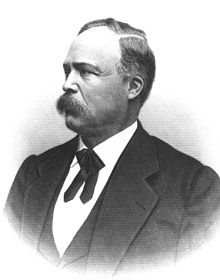Miguel Antonio Otero (I)
| Miguel Antonio Otero | |
|---|---|
 |
|
| Member of the U.S. House of Representatives from New Mexico Territory's At-large district |
|
|
In office July 23, 1856 – March 3, 1861 Delegate |
|
| Preceded by | José Manuel Gallegos |
| Succeeded by | John S. Watts |
| Personal details | |
| Born | June 21, 1829 Valencia County, (then Mexico; now New Mexico, USA) |
| Died | May 30, 1882 (aged 52) Las Vegas, New Mexico Territory |
| Political party | Democratic |
| Alma mater | Pingree College |
| Occupation | lawyer, politician, businessman, banker |
Miguel Antonio Otero (June 21, 1829 – May 30, 1882) was a prominent American politician of the New Mexico Territory and instrumental in the economic development of the territory.
Miguel Antonio Otero was born in Valencia, Nuevo México to Don Vicente Otero and Doña Gertrudis Aragón de Otero. Don Vicente had held prominent civic positions as judge and mayor in Valencia County, under both Spanish and Mexican Governments.
Otero received his early education in Valencia. In 1841 he enrolled at St. Louis University in the state of Missouri and subsequently graduated from Pingree College in Fishkill, New York, where he taught while he began his study of law. In 1851 he returned to Missouri, where he studied law and was admitted to the bar. He was a public advocate of the Mexican-American War.
In 1852 Otero became the private secretary to the Governor of New Mexico, William C. Lane, and was elected to the second Legislative Assembly of the territory of New Mexico. In 1854 he was appointed attorney general for the territory, and served for two years. On July 23, 1856 he was seated as a Democratic Delegate to the U.S. House of Representatives, after successfully contesting the election of José Manuel Gallegos. With the support of the Bishop of New Mexico, Jean Baptiste Lamy, Otero was reelected to the next two Congresses, but was not a candidate for renomination in 1860.
An outspoken Congressman and a strong supporter of the railroad, Otero devoted much of his efforts to the construction of the transcontinental railroad through New Mexico. He introduced the Memorial of the New Mexican Railway Company, in Relation to the Pacific Railroad on May 21, 1860.
...
Wikipedia
